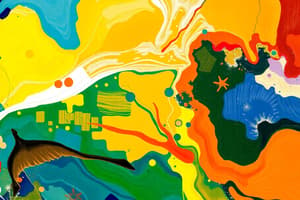Podcast
Questions and Answers
Match the following types of rocks with their formation processes:
Match the following types of rocks with their formation processes:
Igneous = Formed from molten magma or lava Sedimentary = Formed from compressed sediment Metamorphic = Formed from altered existing rocks under high pressure and temperature Foliated = Formed from layered minerals
Match the following weather patterns with their descriptions:
Match the following weather patterns with their descriptions:
Trade winds = Winds that blow from east to west near the equator Wasterlies = Winds that blow from west to east in the middle latitudes Jet stream = Fast-moving winds in the upper atmosphere Horse latitudes = Region of high pressure near the equator
Match the following natural resources with their characteristics:
Match the following natural resources with their characteristics:
Solar energy = Energy generated from the sun Fossil fuels = Non-renewable energy sources formed from ancient plants and animals Hydro energy = Energy generated from moving water Minerals = Inorganic compounds formed through geological processes
Match the following human impacts on the environment with their effects:
Match the following human impacts on the environment with their effects:
Match the following Earth's water systems with their percentages of Earth's water:
Match the following Earth's water systems with their percentages of Earth's water:
Match the following water cycle processes with their descriptions:
Match the following water cycle processes with their descriptions:
Flashcards are hidden until you start studying
Study Notes
Earth's Systems (MS-ESS1-2 NGSS)
Earth's Materials
- Rocks and Minerals:
- Rocks: naturally occurring solid mass of mineral material
- Minerals: naturally occurring inorganic solid with a specific chemical composition and crystal structure
- Types of rocks: igneous, sedimentary, metamorphic
- Soil Formation:
- Weathering: breakdown of rocks into smaller particles
- Erosion: removal of soil particles through wind, water, or ice
- Deposition: settling of soil particles in a new location
Weather Patterns
- Weather vs. Climate:
- Weather: short-term atmospheric conditions (temperature, humidity, cloudiness, etc.)
- Climate: long-term average atmospheric conditions
- Global Wind Patterns:
- Trade winds: near the equator, blowing from east to west
- Wasterlies: in the middle latitudes, blowing from west to east
- Jet stream: fast-moving winds in the upper atmosphere
- Water Cycle:
- Evaporation: water evaporates from oceans, lakes, and rivers
- Condensation: water vapor cools and forms clouds
- Precipitation: water falls to the ground as rain, snow, or hail
Natural Resources
- Renewable Resources:
- Solar energy: energy from the sun
- Wind energy: energy generated by wind
- Hydro energy: energy generated by moving water
- Non-Renewable Resources:
- Fossil fuels: coal, oil, and natural gas
- Minerals: metals and other inorganic compounds
- Conservation:
- Reducing waste and pollution
- Preserving natural habitats and ecosystems
Human Impact
- Environmental Changes:
- Deforestation: clearing of forests for human use
- Pollution: release of harmful substances into the environment
- Climate change: global warming and associated effects
- Sustainable Practices:
- Reduce, Reuse, Recycle
- Using public transportation or carpooling
- Using energy-efficient appliances
Earth's Water Systems
- Water Distribution:
- Oceans: 97% of Earth's water
- Ice caps and glaciers: 2% of Earth's water
- Freshwater lakes, rivers, and groundwater: 1% of Earth's water
- Water Cycle Processes:
- Evaporation: water evaporates from oceans, lakes, and rivers
- Condensation: water vapor cools and forms clouds
- Precipitation: water falls to the ground as rain, snow, or hail
- Water Conservation:
- Reducing water waste
- Using water-efficient appliances
- Harvesting and storing rainwater
Earth's Materials
- Rocks are naturally occurring solid masses of mineral material
- Minerals are naturally occurring inorganic solids with a specific chemical composition and crystal structure
- There are three types of rocks: igneous, sedimentary, and metamorphic
- Soil formation involves three stages: weathering, erosion, and deposition
- Weathering is the breakdown of rocks into smaller particles
- Erosion is the removal of soil particles through wind, water, or ice
- Deposition is the settling of soil particles in a new location
Weather Patterns
- Weather refers to short-term atmospheric conditions, such as temperature, humidity, and cloudiness
- Climate refers to long-term average atmospheric conditions
- Global wind patterns include trade winds, wasterlies, and jet streams
- Trade winds blow from east to west near the equator
- Wasterlies blow from west to east in the middle latitudes
- Jet streams are fast-moving winds in the upper atmosphere
Water Cycle
- Evaporation occurs when water evaporates from oceans, lakes, and rivers
- Condensation occurs when water vapor cools and forms clouds
- Precipitation occurs when water falls to the ground as rain, snow, or hail
- The water cycle is a continuous process involving evaporation, condensation, and precipitation
Natural Resources
- Renewable resources include solar energy, wind energy, and hydro energy
- Solar energy is generated from the sun
- Wind energy is generated by wind
- Hydro energy is generated by moving water
- Non-renewable resources include fossil fuels and minerals
- Fossil fuels include coal, oil, and natural gas
- Minerals are metals and other inorganic compounds
- Conservation involves reducing waste and pollution, and preserving natural habitats and ecosystems
Human Impact
- Environmental changes caused by human activities include deforestation, pollution, and climate change
- Deforestation is the clearance of forests for human use
- Pollution involves the release of harmful substances into the environment
- Climate change refers to global warming and associated effects
- Sustainable practices include reducing, reusing, and recycling, using public transportation or carpooling, and using energy-efficient appliances
Earth's Water Systems
- Oceans hold 97% of Earth's water, ice caps and glaciers hold 2%, and freshwater lakes, rivers, and groundwater hold 1%
- Water distribution involves the movement of water between these sources
- Water cycle processes include evaporation, condensation, and precipitation
- Water conservation involves reducing water waste, using water-efficient appliances, and harvesting and storing rainwater
Studying That Suits You
Use AI to generate personalized quizzes and flashcards to suit your learning preferences.




